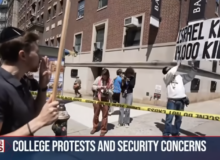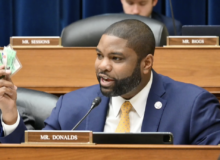Here, https://www.washingtonexaminer.com/opinion/slates-slow-burn-on-david-duke-is-gripping-drama-with-lessons-for-today, I write about Slate’s remarkably well researched and reported six-part podcast series looking back 30 years at the three-year peak of David Duke’s career and the surprisingly difficult, but inspirational, battle to defeat him.
I really urge you to make the time to listen to the whole series. Yeah, I might have done it a little differently in some parts, but it is tremendously thorough, fair-minded, and well told. It is a masterful job of journalism.
Now in addition I write, just so it will be SOMEWHERE in the record, a list of people to whom great credit is owed for their contributions to the anti-Duke effort. Some, but not all, were featured in the Slate podcast. I have neither room nor time to describe all their contributions, so this will mostly be a list of names. But I want the list in the record, so here goes.
First, while I have always said I thought my friend Beth Rickey was the most courageous person in the anti-Duke movement, I think that the absolute top hero for day-to day, year-through-year, consistent, focused, effective effort was Lance Hill, the heart and soul of the Louisiana Coalition Against Racism and Nazism (LCARN). Lance, I tip my hat to you.
Others involved with LCARN who merit great credit, often without ever having really received it or enough of it, include Tulane professor Lawrence Powell, the late Rev. James Stovall, (Jewish leader) Jane Buchsbaum, and Sheldon Beychok. For a while, Dawn Laguens was a very effective and creative employee of the group.
Legislators who were particularly helpful were Mitch Landrieu, Marc Morial, and John Hainkel — the latter of whom sent Duke down rabbit holes where he could do the least damage. I seem to remember Jim Donelon also being steadfast against Duke at every step.
Journalist credited by Slate during the podcasts rightly included the indefatigable Tyler Bridges, along with Norman Robinson, Jason Berry, James Gill, Stephanie Riegel, and Plater Robinson. Ones who for some reason never get enough credit include the inimitable Ronni Patriquin, Lanny Keller, Allen Johnson Julia Reed, and my bosses and friends at Gambit Weekly, Clancy and Margo DuBos, who encouraged me (and Jason and others) to publish probably the most consistent volume of reports on Duke of any publication anywhere, while Clancy penned excellent columns and institutional editorials of his own.
Kirby Newburger received his due from Slate for his famous bumper sticker saying “Vote for the Crook. It’s important.” Maple Street Bookstore owner Rhoda Faust played a major role in spreading those bumper stickers, but hasn’t received her due.
Politically, nobody but I ever acknowledges the incalculably high importance of keeping Duke from taking over the Louisiana state Republican Party’s official structure, nor — and this is so crucial — the absolutely essential role played by the Louisiana Christian Coalition in making sure Duke didn’t do so. The key organizer and intermediary between the party’s “old regulars” and the Coalition was Rhett Davis. He turned the key that opened the lock for the Coalition to organize against Duke at two consecutive state conventions, ensuring that he received less than 10% of the delegates at each. The late (I think) John Rondeno played a role, too, as did others.

Also crucial to keeping Duke out of the party structure were organized Young Republicans (and I think College Republicans) throughout the state. Sadly, Slate painted state chairman Billy Nungesser as somewhat of a villain in the anti-Duke wars (for various reasons), but he was absolutely dedicated to, and effective at, keeping Duke’s hands off the party’s levers. In that effort, no single person was more important to keeping Billy focused on that than my dad, Haywood H. Hillyer III, the state party’s National Committeeman. Dad also worked to encourage Beth Rickey behind the scenes, provided anti-Duke info and quotes to journalists, and tried to get state legislators to more openly oppose him. Also, my cousin and state central committeeman (SCC) Tommy Gaudet, who also served as a sort of self-appointed sergeant-at-arms and even bodyguard for Nungesser, provided will and muscle to keep Duke and his minions in check. Party executive director Darryl Gissel ably carried out Nungesser’s wishes. SCC member Neil Curran rightly received credit from Slate for his efforts; almost all the members of the 8-person state party executive officers, such as Ginny Martinez and Marti Hightower, agreed with my dad as well. A shout-out, too, to Linda Talbert, and to John Treen, for their efforts.
Ben Bagert’s U.S. Senate candidacy never gelled, but his work was the basis for the early anti-Duke organizing, without which the state conventions might have been far dicier. Moreoever, when he fell on his sword and withdrew from the race the day before the election, to keep the state and the party from being faced with the nightmare of a month of a runoff with Duke as the face of both, it was one of the most noble but least credited acts of any major candidate in my lifetime. (We saw a year later — 1991 — in the governor’s race, just what a nightmare a Duke runoff could cause; Bagert’s withdrawal kept it from happening in 1990.)
Finally (among politicos), nobody, and I mean nobody, put more on the line, more consistently and with more integrity, than Dave Treen. He opposed Duke at every turn; showily walked out of a state meeting in moral protest when Duke found some excuse for being officially recognized to speak, and famously swallowed his pride and 20 years of insults from Edwin Edwards to urge people to vote for Edwards over Duke. I was standing three feet from him when he held that press conference, and many of the media there looked like they were almost teary-eyed at his eloquence. Edwards himself (and others familiar with the polls and anecdotal evidence) said his own polls showed that the single most important endorsement (although I don’t think Treen technically used that word) in the entire runoff campaign was Treen’s.
The business community, especially in New Orleans, rose to the occasion when it was desperately needed. A leader in that was Pres Kabacoff, and I think I rememver Jim Bob Moffett also being important. So, too, were the massive voter registration drives carried about by black leaders and Democratic Party operatives.
I’m sure I’ve left plenty of people out, and when I remember them, I’ll come back in and add them here. (Oh, wait, here’s one I meant to write: Anne Skorecki Levy, the holocaust survivor who confronted Duke at a crucial time.) For now, though, this is my record of the honor roll, so any future researchers will, if they stumble across this little web site, be able to see their names.
Thanks to all of them.






